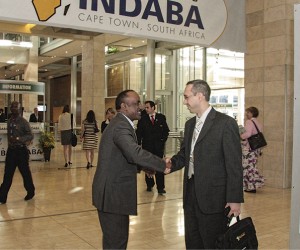Transparency is one of the major issues facing companies’ and governments’ operation in the mining space in Africa, but with some improvements being made in recent years, says Mining Indaba speaker, Dr Nicole Bieske, Head of Programme–Mining for Sustainable Development, Transparency International
Dr Nicole Bieske leads the Mining for Sustainable Development programme, and has over 14 years’ experience in senior leadership roles in not-for-profits, both in international non-governmental organisations and at the grassroots.
At Oxfam, she managed policy, advocacy and campaigns teams within Australia and globally. Prior to her role at Oxfam Nicole was the CEO at Inner Melbourne Community Legal where she oversaw the provision of legal services to vulnerable and marginalised community members through a range of legal outreach programs and community partnerships.
She has significant governance experience having served on both the Australian and global boards of Amnesty International since 2004, and has worked as a human rights consultant for the United Nations.
Has transparency improved in African Mining over the last 10 years?
Transparency International has been tracking people’s perception of corruption since 1995 in the Corruption Perceptions Index published annually. The index ranks 180 countries by their perceived levels of public sector corruption. No African country has ever made the top 20 least corrupt countries. However recently, Rwanda and Cabo Verde have improved, and long-term work in Cotes d’Ivoire and Senegal is steadily paying off. Meanwhile, over the past decade we have seen steadily growing focus on corruption in the mining sector. The Extractive Industry Transparency Initiative and Publish What You Pay were established in 2002 to promote transparency around natural resource management. The EITI now works in 51 countries and has established a global standard to promote accountable management of oil, gas and mineral resources.
More recently, the Natural Resource Governance Institute was established in 2013 to promote accountable and effective governance in the extractive industries. And of course, Transparency International joined these efforts when we launched the Mining for Sustainable Development Programme in 2016. There is clearly strong interest in more accountable and transparent mining operations, and stronger pressure on governments and companies to uphold better standards. Indeed last year, the African Union declared ‘Winning the Fight against Corruption’ to be the theme of its work in 2018. Tackling corruption is hard work and takes time, but there is absolutely no turning back—not when there are more and more people shining a spotlight on corruption and demanding change.
How have transparency initiates improved the situation?
Transparency International’s (TI’s) Mining for Sustainable Development programme brings together sister organisations across 20 resource-rich countries to tackle corruption. African countries make up almost half of our network. Across the research and the advocacy and policy phase of the programme, our African partners have included organisations in the Democratic Republic of Congo, Ghana, Kenya, Madagascar, Mozambique, Niger, Sierra Leone, South Africa, Zambia and Zimbabwe.
More TI organisations in African countries are interested joining the programme. As I said, there is a lot of interest and energy in fighting corruption and people want to get on board – including government, business and the community.
Our African partners are shining a spotlight on the risks of corruption. They are looking specifically at where and how corruption can occur when a company applies for the right to mine. They are sharing their research with people, government officials and companies, so everyone can better understand how the process works, and where we need to work together to make that process fairer. Our African partners have been energetically engaged in discussions with key players - national governments, mining companies and community groups to highlight the corruption risks and discuss strategies to improve the process.
What are the keys to Sustainable Development in mining globally?
Mining for Sustainable Development is a globally coordinated, but locally embedded programme that combines locally-led research and advocacy with global engagement. Our network across 20 countries also supports each other by sharing knowledge, skills, resources and contacts, making our impact so much stronger. We are specifically looking at the very start of the value chain. By closing the loopholes and strengthening our process, we aim to stop corruption before ground is even broken. We believe that with strong, transparent and accountable foundations, we can set up a better mining process across the rest of the value-chain—a process that takes care of our environment and enables people to prosper fairly.
What steps can be undertaken by companies and governments to improve their performance in terms of transparency?
- Commit to transparency. Governments should set clear, transparent and effective rules and criteria for mining approvals processes; and they should enable the public to access this information. Companies should be transparent about their operations, including their subsidiaries, joint venture partners and where they operate. They should also disclose their project rights and obligations, including contracts, licenses, and environmental and social impact and management plans.
- Avoid conflicts of interest. Governments should implement mechanisms to reduce conflicts of interest—such as a Minister for Mining profiting personally from a mine, or a political party receiving donations from mining company. Companies can also support better political integrity by refusing to donate to political parties and by disclosing beneficial ownership – i.e. who ultimately benefits from a mining operation.
- Do your due diligence. Governments should do their research on license applicants to know who their beneficial owners are and whether they are responsible companies—for example, companies that have not been involved in criminal activities, poor environmental performance or social harm. Companies can also go ‘beyond compliance’ where a country’s licensing standards or disclosure requirements are lax and below best practice. Companies should always operate with integrity, taking care to minimise harm to the environment and local communities.






